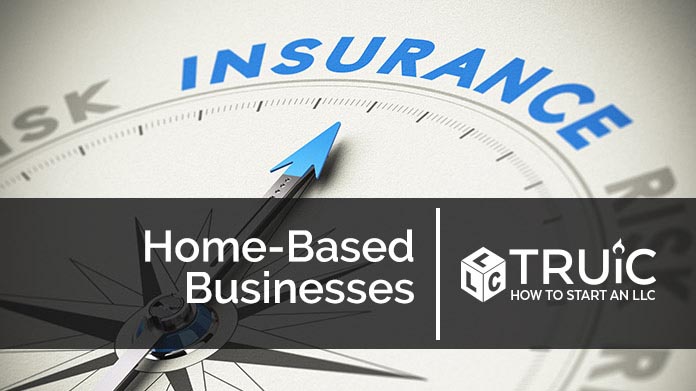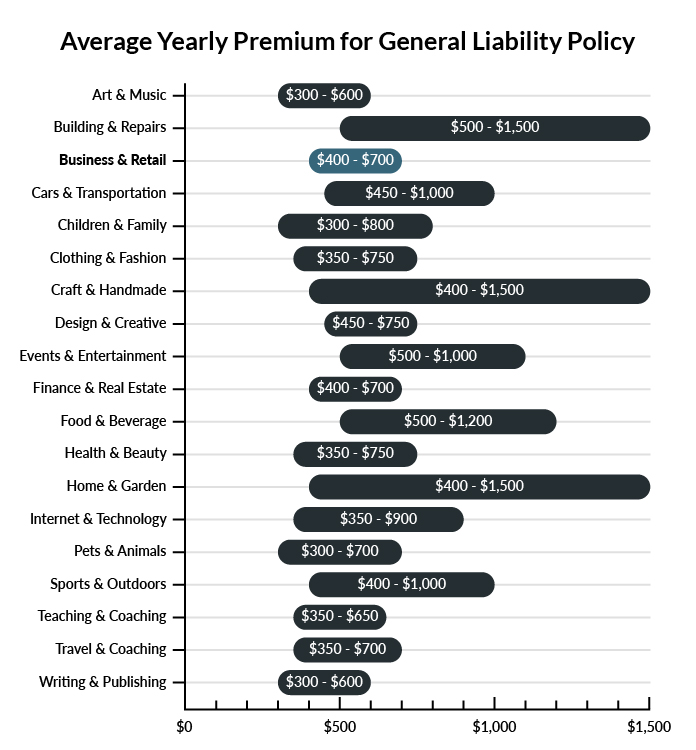Insurance for Home-Based Businesses
Even home-based businesses need insurance. Knowing which type of insurance you need and the best place to get it is the next step.
This article will cover the main types of business insurance and help you find the best business insurance for home-based businesses.

Recommended: Next Insurance is dedicated to matching small businesses with the right policy at the best price.
Best Insurance for a Home-Based Business
The most common and comprehensive type of home-based business insurance is general liability insurance. We recommend general liability insurance as your first line of defense against a variety of the most general and commonly occurring claims.
Some of the risks general liability insurance covers are:
- Bodily injury
- Property damage
- Medical payments
- Legal defense and judgment
- Personal and advertising injury
While a home-based business isn’t legally required to carry general liability insurance, operating without it is extremely risky. If your home-based business is sued, you could face fees totaling hundreds of thousands of dollars (or more).
Let's Find the Coverage You Need
The best insurers design exactly the coverage you need at the most affordable price.
Cost of General Liability Insurance
The average home-based business in America spends an average of $500 per year for $1 million in general liability insurance coverage.
Compare the average cost of general liability insurance for a home-based business to other professional industries using the graph below.
Several factors can determine the price of your insurance policy. These include your:
- Location
- Deductible
- Number of employees
- Per-occurrence limit
- General aggregate limit
You may be able to acquire general liability insurance at a discounted rate by purchasing it as part of a business owner’s policy (BOP) rather than as a standalone policy.
A BOP is a more comprehensive solution that includes multiple forms of coverage, such as business interruption and property insurance.

Find the Best Rate
Discover the best coverage at the lowest rate in our affordable business insurance review.
Common Situations That General Liability Insurance May Cover for a Home-Based Business
Example 1: Although you only take an occasional business meeting at your home based business, sometimes customers stop by your home to drop off paperwork or pay their invoice. On a particular rainy day, a customer slips and falls while dropping off a contract and check and has to be taken to the hospital by ambulance. If found liable, your business could be covered by general liability insurance for medical damages owed or a settlement with the injured customer.
Example 2: A customer claims that a product that you manufacture at your home based business was faulty and caused a fire. The customer sues your business for significant damages, including damages to their home, temporary housing expenses, and their own psychological shock. If found liable, general liability insurance may be able to help cover your legal expenses as well as some of the losses as ordered by a court or settled upon privately.
Example 3: While building your website, you come across a slogan and tagline that you really like that is used by one of your competitors. You change up a few words and adapt this as your own slogan and tagline, but your competitor sues you for copyright infringement claiming it is substantially similar to their slogan and messaging. Your general liability insurance may help you pay for your legal defense and cover the cost of any settlement or judgment if you are found liable.
Other Types of Coverage Home-Based Businesses Need
While general liability is the most important type of insurance to have, there are several other forms of coverage you should be aware of. Below are some of the most common types of coverage:
Commercial Property Insurance
If your home-based business owns any type of property worth $10,000 or more, you will need to invest in a commercial property insurance policy to insure your business’s assets. Many home-based businesses quickly rack up this amount in computers, equipment, and inventory.
Commercial property insurance helps cover the costs of replacing/repairing inventory, equipment, real estate, and more in the event of unexpected damage.
Commercial Umbrella Insurance
For many home-based businesses, commercial umbrella insurance is an important policy to take out. Commercial umbrella insurance exists to cover those gaps beyond existing policies, ensuring that your home-based business doesn’t find itself crippled by an extreme and unpredictable loss.
Commercial Auto Insurance
If your home-based business owns any vehicles, you will also need a commercial auto insurance policy. This insurance policy will cover automotive damages incurred if your automobile or delivery vehicle is damaged on the road.
Cyber Liability Insurance
Another type of insurance that home-based businesses may want to consider is cyber liability insurance. In the event of a data breach or other cyber security incident, any business dealing with sensitive information should have cyber liability insurance in place to cover the costs associated with the breach as well as any additional losses the firm may incur.
Home-Based Business Insurance
When running a business from home, your normal home insurance policies may not cover accident damages related to your business. Home-based business insurance is designed with this in mind, and it is often available through a business owner’s policy or as a rider extension for existing homeowner insurance.
Professional Liability Insurance
Professional liability insurance, sometimes called errors and omissions insurance, is a must-have for any type of business or professional service. Depending on the nature of your home-based business, you could be at risk of being sued for making a mistake. Errors and omissions (E&O) insurance helps protect your business in the case of costly mistakes, oversights, or omissions.
Worker’s Compensation Insurance
In most states, if you have any employees other than yourself and sometimes family members, you will need to purchase worker’s compensation insurance. Workers' compensation insurance, or "worker’s comp” for short, is a type of insurance that covers accidents, injuries, and illnesses that employees may suffer on the job. Worker’s compensation coverage aids with the payment of medical expenses, missed wages, and other costs associated with illness or injury, no matter who was at fault.
Additional Steps To Protect Your Business
Although it’s easy (and essential) to invest in business insurance, it shouldn’t be your only defense.
Here are several things you can do to better protect your home-based business:
- Use legally robust contracts and other business documents. (We offer free templates for some of the most common legal forms.)
- Set up an LLC or corporation to protect your personal assets. (Visit our step-by-step guides to learn how to form an LLC or corporation in your state.)
- Stay up to date with business licensing.
- Maintain your corporate veil.
Home-Based Business Insurance FAQ
Yes, absolutely. You will need to first get a quote from an online business insurance provider like Next Insurance. Next allows you to then purchase a policy immediately and your coverage will be active within 48 hours.
A typical business owner’s policy includes general liability, business interruption, and commercial property insurance. However, BOPs are often customizable, so your agent may recommend adding professional liability, commercial auto, or other types of coverage to your package depending on your company’s needs.
"Business insurance" is a generic term used to describe many different types of coverage a business may need. General liability insurance, on the other hand, is a specific type of coverage that business owners need to protect their assets.
You should invest in business insurance coverage for your business before your first interaction with a customer. Although the cost of insurance may seem high for a brand new business, it’s best to be proactive when it comes to protecting your assets. After all, you can’t buy insurance to cover a loss that has already occurred.
Not necessarily. Certain exceptions may be written directly into your home-based business insurance policy, and some perils may be entirely uninsurable.
A general liability insurance policy covers only liability losses. A business owner's policy covers both liability and property losses.
The best general liability coverage for your business really depends on the amount of coverage you’re comfortable with and how often you expect to file a claim. A relatively safe business with a very low risk of accident or legal liability could opt for lower premiums with higher deductibles.
However, if you are in an accident or injury-prone industry or are making advertising claims about the effectiveness of your service or product, you may wish to consider more extensive coverage. We recommend using a digital insurance provider like Next Insurance.
Yes, an LLC is meant to create a legal barrier between your business and your personal assets and credit. If you haven’t formed an LLC yet, use our Form an LLC guide to get started.
An LLC doesn’t protect your business assets from lawsuits and liability– that’s where business insurance comes in. Business insurance helps protect your business from liability and risk.